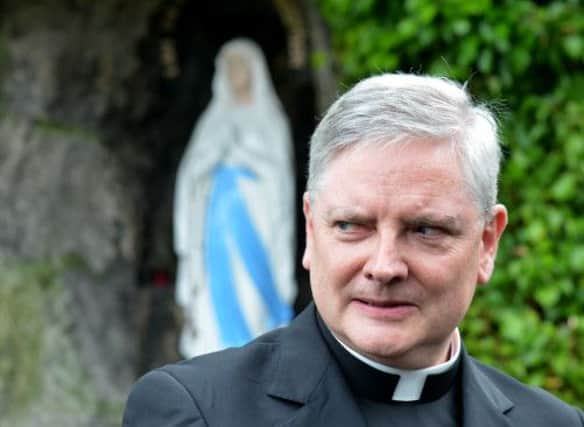Euan McColm: Archbishop will have to be humble


Not that this would normally matter but, given the ongoing crisis in the Scottish Catholic Church, these little details are public relations gold.
Mgr Cushley, a 52-year-old from Airdrie who once served as a priest in Motherwell, has been plucked from the Vatican’s diplomatic corps and sent home to Scotland to become the next Archbishop of St Andrews and Edinburgh, a role previously held by Cardinal Keith O’Brien.
Advertisement
Hide AdAdvertisement
Hide AdThe cardinal’s resignation in February, after admitting “inappropriate behaviour” with a number of priests, redefines the job of his successor. Yes, his responsibility will be to the faithful, but Mgr Cushley faces a greater challenge than any who served before him.
He might not enjoy the rank of cardinal (a prince of the Church), he might not even be the most senior Catholic in Scotland (he has an equal in Archbishop Philip Tartaglia, who oversees the archdiocese of Glasgow) but after Mgr Cushley’s ordination on 21 September, it will fall to him to rebuild the church and its reputation. And that’s a task that will require a great deal more than some slick spin about the new archbishop’s ordinary blokeyness.
O’Brien’s fall from grace came after a prolonged period when the Catholic Church in Scotland appeared to have lost its way, or at least its sense of priorities.
A months-long campaign against plans – still on course in Scotland, already law in England and Wales – to allow same sex couples to marry created the impression that the Church was obsessed with matters carnal above all else. The language used by spokesmen was frequently cruel and combative. That the Church seemed consumed by this issue while saying little about, for example, rising poverty, compounded the sense that its moral compass was on the fritz.
Mgr Cushley said last week that his task in Scotland would be “comparatively easy” after some of his past duties, which included a number of missions carried out in Africa. Those must have been some hellish tough gigs.
There will be nothing easy about restoring the standing of the Church or, I imagine, winning back the respect of the many members of the congregation (and there are still not far off a million Scots Catholics) who believe themselves misrepresented by the angry, anti-gay marriage campaign. Perhaps Mgr Cushley might look for guidance to the head of the Church of England, Justin Welby.
The Archbishop of Canterbury this week told the payday lender Wonga – a legitimate finance company whose 5,853 per cent annual interest rates have the whiff of the shark about them – that he wanted to “compete” it out of business with Church support for credit unions. Didn’t that sound exactly the sort of thing a modern church, confronted by modern problems, should be doing?
Embarrassingly for Welby, it transpired that the Church of England holds a £1 million-plus stake in one of Wonga’s main backers but, if we accept reassurances that it was unaware that its cash had been so invested and that it is doing something about it, right now, then it remains a great example of how the Church – any church – can put its energy into campaigning on behalf of the poor and the vulnerable. Mgr Cushley can’t just pinch some Welby ideas, of course, but he can take from him the lesson that his Church must get back to dealing with sharp-end issues.
Advertisement
Hide AdAdvertisement
Hide AdThe Breadline Britain Poverty and Social Exclusion report – compiled by a team including academics from Glasgow and Heriot Watt universities – revealed recently that poverty in Scotland is at its highest level for 30 years, with almost a third unable to afford the basic necessities of warm clothes, a dry home, and a decent diet. While poverty is a reality, the Church has a job to do.
Mgr Cushley – as a senior member of the Vatican hierarchy – is unlikely to reveal himself to be an enthusiastic supporter of gay marriage, but he would be wise to consider that one a battle already lost and to ignore pressure from traditionalists who seem determined to keep going as though the Scottish Government’s Equal Marriage Bill is “just a flesh wound”.
The selection of a Church diplomat to succeed O’Brien suggests that Pope Francis understands the role demands someone with political nous. Let’s not be coy: the Scottish Catholic Church, to the dismay of many members, is to blame for its own tattered reputation. If Mgr Cushley adopts a pragmatic approach to matters of sexual behaviour and leads with a focus on tackling poverty and inequality, then he may begin to restore some credibility to the church.
There are other big issues on the agenda for Mgr Cushley. The Scottish Government’s sectarianism advisory group last week argued that it was time to redouble efforts to tackle religious bigotry. Dr Duncan Morrow, chairman of the taskforce, claimed that too many Scots prefer to “minimise” the problem rather than confronting it.
Mgr Cushley will find a role waiting in breaking down barriers between communities. He’ll also come into the job less than a year before the referendum on Scottish Independence. He should feel able to speak on the subject. Though declaring a position may be a step too far, it wouldn’t be unreasonable for the Catholic Church to question the promises made by those on both sides of that debate.
Leo Cushley may have been introduced to us this week as an ordinary guy with ordinary interests but those with an interest in the future of the Catholic Church in Scotland should hope he’s a little more than that. The Church is in extraordinary turmoil. The only response from the new archbishop can be exceptional leadership, combined with genuine humility. «
Twitter: @euanmccolm